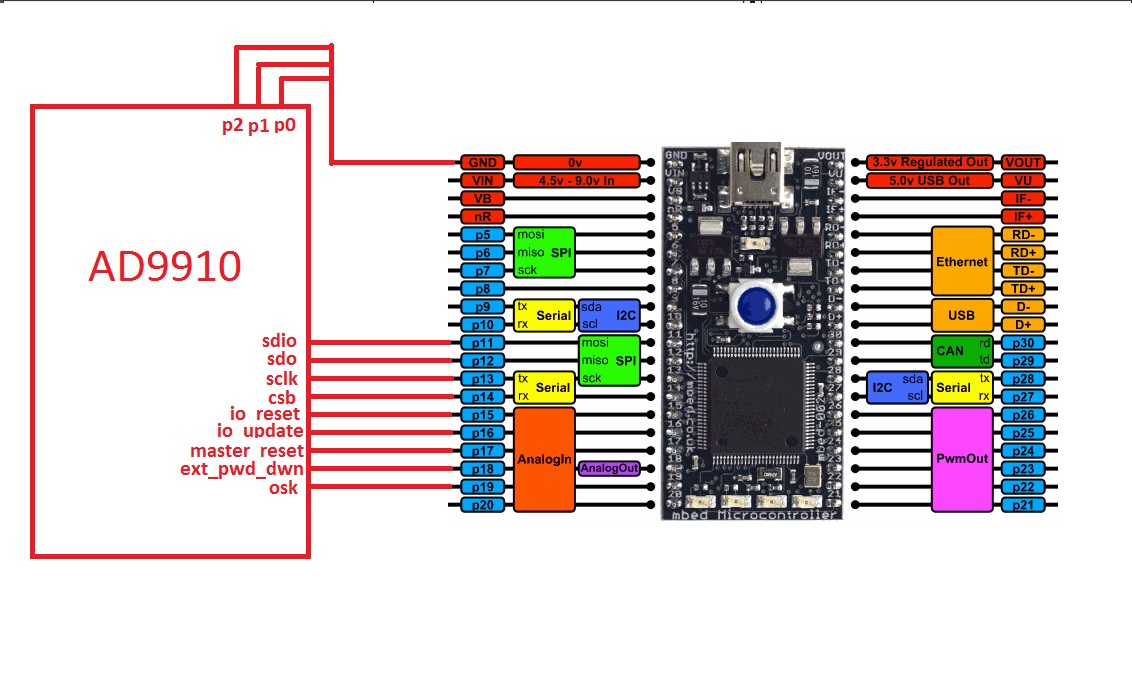Important changes to forums and questions
All forums and questions are now archived. To start a new conversation or read the latest updates go to forums.mbed.com.
8 years, 11 months ago.
Controlling AD9910 DDS with mbed
Hi,
I'm a student who wants to work with DDS AD9910 with SPI bus.
here you can find datasheet :http://www.analog.com/media/en/technical-documentation/data-sheets/AD9910.pdf
I using this configuration :

is that right ?
We want to have a frequency out of 100 Mhz, what kind of word we have to send ?
we want to sweep from 1MHz to 200 with a step of 5Hz.
I have a code but don't work !
can you help me ?
Thanks in advance for your help.
here is the code was adapted :
#include "mbed.h"
#include "AD9910.h"
Serial pc(USBTX, USBRX);
DigitalOut myled(LED1);
DigitalOut _fud(p16);
AD9910 myDevice(p11, p12, p13, p14, p15); //mosi, miso, sclk, cs, rst.
DigitalOut MASTER_RESET(p17);//DDS' Master_Reset pin.
DigitalOut EXT_PWD(p18); //EXT_POWER_DOWN pin of DDS.
int main() {
EXT_PWD=1;
wait(0.1);
EXT_PWD=0;
wait(0.1);
MASTER_RESET=1;
wait(0.1);
MASTER_RESET=0;
wait(0.1);
_fud.write(0);
// in register 2:
//bit3-bit7 contain the multiplication value for the clock. multiply the 10 MHz input by 10: [01010], the vco is then not in the upper range, therefore bit2=0,
// from this follows bit7-bit0: 00 00 0101 0000 -> 00 00 50
myDevice.CFR2_write(000050);
// now we have a 100 MHz clock, the frequency tuning word for around 6 MHz output is ((12.5:2)/100)*2^(32) =268435456
//= 10000000
myDevice.FTW0_write(0x10000000);
// issue I/O update
_fud.write(1);
wait(0.1);
_fud.write(0);
uint32_t c2;
c2 = myDevice.CFR2_read();
pc.printf("c2= %X\n", c2);
uint32_t ftwo;
ftwo = myDevice.FTWO_read();
pc.printf("FTWO = %X\n", ftwo);
return 0;
}
//#################### AD9910.h ###########################
#ifndef AD9910_H
#define AD9910_H
#include "mbed.h"
class AD9910 {
protected:
SPI _spi;
DigitalOut _cs;
DigitalOut _rst;
public:
AD9910(PinName mosi, PinName miso, PinName sclk, PinName cs, PinName rst) :
_spi(mosi, miso, sclk), _cs(cs), _rst(rst)
{
// see http://mbed.org/handbook/SPI and page 23 why format 0
_spi.format(8, 0);
_spi.frequency(1000000);
// master reset the device:
_rst.write(1);
wait(0.1);
_rst.write(0);
};
// Write a 32bit register at the specified address.
void write_reg_4byte(uint32_t address, uint32_t value) {
// Instruction byte: page 25 in datasheet, we want to write (0), so 0100 + internal adress of the register to be written in
_spi.write(0x00 | (address & 0x1F));
_spi.write((value >> 24) & 0xFF);
_spi.write((value >> 16) & 0xFF);
_spi.write((value >> 8) & 0xFF);
_spi.write((value >> 0) & 0xFF);
}
// Write a 24bit register at the specified address.
void write_reg_3byte(uint32_t address, uint32_t value) {
// Instruction byte: page 25 in datasheet, we want to write (0), so 0100 + internal adress of the register to be written in
_spi.write(0x00 | (address & 0x1F));
_spi.write((value >> 16) & 0xFF);
_spi.write((value >> 8) & 0xFF);
_spi.write((value >> 0) & 0xFF);
}
// Read a 32bit register at the specified address.
uint32_t read_reg_4byte(uint32_t address) {
uint32_t value = 0x00000000;
_spi.write(0x80 | (address & 0x1F)); // Instruction byte
value |= _spi.write(0x00);
value = value << 8;
value |= _spi.write(0x00);
value = value << 8;
value |= _spi.write(0x00);
value = value << 8;
value |= _spi.write(0x00);
return value;
}
uint32_t read_reg_3byte(uint32_t address) {
uint32_t value = 0x000000;
_spi.write(0x80 | (address & 0xF)); // Instruction byte
value |= _spi.write(0x00);
value = value << 8;
value |= _spi.write(0x00);
value = value << 8;
value |= _spi.write(0x00);
return value;
}
// Write
void CFR1_write(uint32_t reg) { write_reg_4byte(0x00, reg); }
void CFR2_write(uint32_t reg) { write_reg_3byte(0x01, reg); }
void FTW0_write(uint32_t reg) { write_reg_4byte(0x04, reg); }
// Read
uint32_t CFR1_read(void) { return read_reg_4byte(0x0); }
uint32_t CFR2_read(void) { return read_reg_3byte(0x1); }
uint32_t FTWO_read(void) { return read_reg_4byte(0x4); }
};